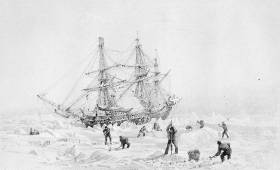Displaying items by tag: Francis Crozier
Discovery Of Second Ship From Franklin's Lost Expedition May Rewrite History Of Northwest Passage
#HMSTerror - The discovery of what appears to be the wreck of the long-lost HMS Terror may rewrite the history of one of the biggest mysteries of polar exploration.
According to The Guardian, the nearly completely intact Vesuvius-class bomb vessel was found in a stroke of luck by researchers in an Arctic bay in the far north of Canada.
And their find was almost exactly 170 years to the day since the Terror and sister ship HMS Erebus were first trapped in polar ice northwest of King William Island in Victoria Strait.
Both vessels were part of an expedition by Sir John Franklin to complete the Northwest Passage in the 1840s, but Franklin did not live to see the final days of the ill-fated mission.
He was succeeded in June 1847 by Banbridge native Captain Francis Crozier, whose last known effort, as evident from a scrawled note from previous recovered records, was an attempt a year later to lead the remaining crew to safety along a river to the south, though no trace of their movements has been found.
However, the discovery of the Terror some 100km south of where it was previously believed crushed by the ice opens up a wealth of questions as to how Capt Crozier and his crew survived the extremes of the region for so long.
The Guardian has much more on the story HERE.






























































